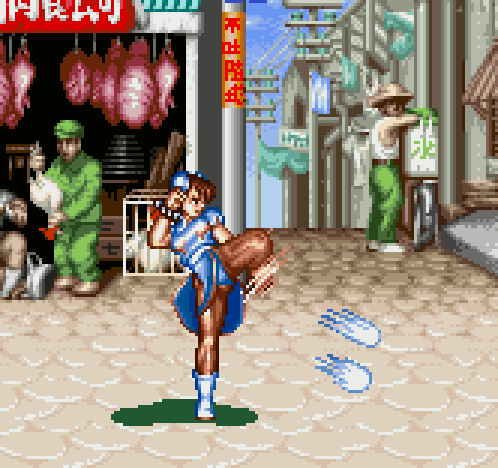Fighting games are invading popular music faster than you can say “Up, down, up, up, down, left, right, left right, A B A B.”
Ask a queer person their favorite fighting game and, more likely than not, you’re bound to get a passionate answer. Mine is Marvel vs. Capcom 2 for Sega Dreamcast, because of its jazzy soundtrack, but most importantly because it was the first Marvel vs. Capcom where you could employ a full roster of female X-Men. (I played only with Storm, Rogue, and Psylocke.)
In the past few months, three high-profile music videos from queer and queer-adjacent artists have relied heavily on visuals and lyrics that invoke old-school console and arcade fighting games. In March, RuPaul’s Drag Race queen Aja released the video for “Finish Her,” in which the queen raps at a breakneck speed over visuals of a Mortal Kombat-style game that asks players to select an avatar with the words “Choose Your Sis.”
In April, Nicki Minaj dropped the song “Chun-Li,” referencing one of the greatest video game characters of all time. An (orientalist) video followed in May. And on Tuesday, rapper CupcakKe dropped her video for “Quiz,” which mashes together Kill Bill Vol.1 visuals with the Street Fighter franchise.
Seeing Black and Brown women and femmes utilize video game imagery in their videos serves as a reminder as to why queer people, especially femmes, stan so hard for the female-identified characters in these games. Drag queens like current Drag Race contestant Kameron Michaels and Dragula winner Biqtch Puddin’ even explored this very topic at a recent RuPaul’s DragCon panel.
In the world of video games, gender matters far less than it does IRL. It’s routine that women and femmes can pulverize overly-muscled male characters. I remember playing as Storm, Psylocke, and Rogue in MVC2 and the satisfaction I’d get from pummeling the Hulk, Juggernaut and Colossus with ease.
Video game vixens explode notions of gender and offered me, and other gamers, a chance to feel like it was possible to be both masculine and feminine, in both demeanor and appearance, without apology. Chun-Li would kick Ryu’s ass then throw up a peace sign and jump up and down in celebration. As Rogue, I could strong arm a foe into submission but also kiss him and suck his health out through his mouth.
For many Black and Brown femmes, video games offered a de facto empowerment: the strength of each character became your own strength. In each of the aforementioned music videos, the artists embody the avatars from Tekken, Street Fighter,and Mortal Kombat rather than select them on screen. And in becoming facsimiles of these beloved characters, each artist reinforces the reality that there is strength to be found in femininity.
These music videos also reiterate the reality that women and queer people deserve a place in video game culture. In 2014, GamerGate exposed the deep, unmended rift in the community between angry white men, who favored an exclusive(ly white) community, and everyone else who identifies as a gamer. Anyone who goes on mic in Overwatch knows that sexism, misogyny and homophobia are still all too prevalent among gamer types, but these videos serve as a reminder that black and brown queers and femmes grew up on and were influenced by video games and that we deserve real estate in the culture.
Don't forget to share:
Help make sure LGBTQ+ stories are being told...
We can't rely on mainstream media to tell our stories. That's why we don't lock our articles behind a paywall. Will you support our mission with a contribution today?
Cancel anytime · Proudly LGBTQ+ owned and operated
Read More in Culture
The Latest on INTO
Subscribe to get a twice-weekly dose of queer news, updates, and insights from the INTO team.
in Your Inbox













